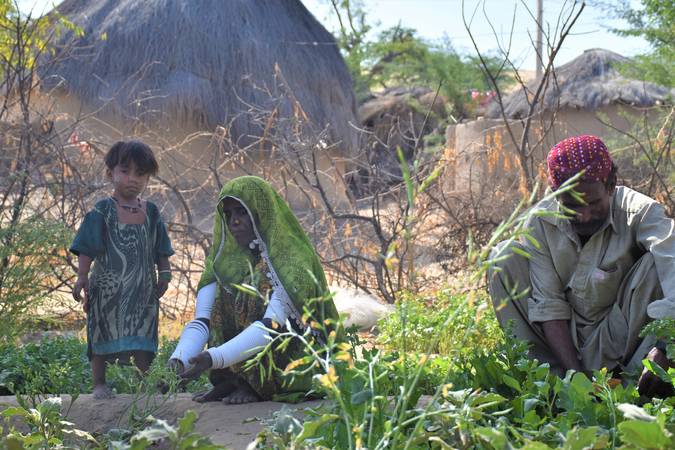Women farmers take the lead in Tharparkar district
Having lived hand-to-mouth her entire life, fifty-year old Amlan did not let her circumstances define her future. She was determined to contribute to creating a better future for herself and for her family.
For as long as they can remember, Amlan and her husband Misree, who worked as a daily wage labourer in the remote village of Sayanser in District Tharparkar, struggled to make ends meet for their family of ten. Even after marrying their four sons and three daughters off they were still unable to meet their daily expenses with the meagre earnings that Misree and his son brought home each day. Their better days comprised of being able to cultivate a small piece of land and cook vegetables for themselves, however, there were also times, particularly during the drought period, when they were forced to sell some of their livestock to help them meet their basic food needs. Most days, when they did not have enough food to put on their tables, they consumed home-made ‘lassi’ (a yoghurt drink) which helped them curb their hunger.
“I spent most of my time cooking and bringing clean drinking water from a water supply line about 1.5 km away from home while my husband and son went out to look for work. It was a massive struggle for us to make ends meet, however, we did not see any way in which we could further bring down our everyday expenses,” recalled Amlan.
The Food and Agriculture Organization (FAO) of the United Nations facilitated a community meeting where women farmers from the village were invited to participate in farmer field schools. The women farmer field schools were being established to help these women famers shift towards more sustainable farming practices. Amlan saw this as a potential opportunity for her family to improve their household circumstances.
“I was very excited when I was first selected as a farmer field school participant. Not only did I learn how to grow seasonal vegetables at home, but I was also able to interact with other women farmers from my village to gain knowledge on the best practices for farming – this has helped me improve the quality of our produce,” said Amlan. “Our lives have turned around. We are now able to save a significant amount of money thanks to the training I have received which has enabled me to grow vegetables at home. As a result of eating safe and nutritious vegetables from our own backyard kitchen garden, our medical expenses have also dropped drastically,” she added contentedly.
Amlan has become an example of hard work, vision and self-determination for her friends and family. After years of living in poverty, she was able to change the lives of her family and provide a good life to her children.

